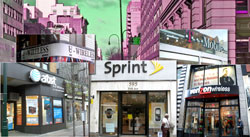
AT&T dominates in the city, with 61 stores citywide. Verizon has 32 and Sprint has 27.
The BlackBerry, iPhone and the Google Phone may be locked in a battle for customers, but at the moment they are all quiet on the New York City real estate front.
Mobile phone outlets of every brand, which gobbled up space all over the city, have retrenched.
Robin Abrams, executive vice president of the Lansco Corporation, explained that expansion leveled off because the big national phone providers such as Verizon, Sprint and AT&T “saturated the market.” Now they are ceding some market share to electronics retailers and discounters, said Van Baker, a research vice president for Gartner, an information and technology research and advisory firm.
“If you just look at Apple, it distributes through its own stores. [And] Best Buy, Radio Shack and Wal-Mart” are also selling phones, Baker said. “This alone has shifted the mix of phone sales away from carrier stores.”
Some smaller cell phone stores have even closed shop, said Andrew Mandell, a managing partner with Ripco Real Estate. Mandell said retailer Wireless Warehouse closed some stores in the last 12 months. “Also, I don’t get as many calls for cell phone stores on our properties,” he said.
And Abrams has struggled recently to find cell phone tenants to lease two small spaces in office buildings One A Former Hair Salon On Greenwich Street in Tribeca, the other a former florist at Court Square in Long Island City. “We reached out specifically to cell phone users, thinking [the buildings] would be an appropriate [location] for them because of the density and the traffic in the areas,” she said. “We aren’t finding anybody.”
Still, Jeffrey Roseman, executive vice president of Newmark Knight Frank, was quick to note that cell phone merchants, both big and small, never saw the robust expansion experienced by bank branches. That’s partly because they lack prestige and are considered something of a lower-end retailer. “They don’t do a lot for the image of a building,” he said.
Exact numbers on total cell phone stores are hard to come by: CITA, the major industry organization, doesn’t track the retail component, nor does the Consumer Electronics Association. But several other brokers said anecdotally, they noticed less activity from cell phone stores.
Cell phone stores are typically 500 to 2,000 square feet in high-traffic spots.
AT&T dominates in New York City. It has 61 stores citywide, including 30 in Manhattan. Verizon operates 32 stores throughout the five boroughs. Sprint has 27 stores, with 10 in Manhattan along with two service centers.
AT&T plans to open three more stores this year and Verizon says it has “a few” in the works, but they appear to be well off their 2008 pace, when they opened 16 stores between them.
But not every cell phone merchant is contracting.
Newcomers to the market such as MetroPCS, which offers prepaid wireless services at highly competitive rates, is eyeing more city spots, brokers said. And wireless data provider Clearwire Communication is planning to open dozens of retail locations in the city over the next year.
Clearwire, based in Kirkland, Wash., will make its New York City debut this fall near Union Square at 865 Broadway between 17th and 18th streets, said David Firestein, president of Northwest Atlantic Real Estate Services, the company’s exclusive broker in the city.
And the idea of what constitutes a cell phone store may be changing.
“You may not be seeing as much expansion with corporate-owned locations, but that doesn’t mean that other distribution channels are not growing,” such as “stores within stores,” or “SWASes,” said David Samberg, a spokesperson with Verizon Wireless. Last year, Verizon opened 38 of these in P.C. Richard & Son locations in New York, New Jersey and Connecticut. It also has them at B.J.’s, the warehouse club.
These “mini stores” are owned by Verizon Wireless and staffed by its employees, Samberg said. The retailer operated SWASes at Circuit City, but when that retailer went belly up, “we lost all those locations and made a deal with P.C. Richard,” Samberg said.